分词作状语
分词作状语

extra pay.
working
3. Seen from the top of the hill, we find
the city more beautiful. Seeing
4. Generally speak, facial expressions are
helpful communications, too. speaking
Having done the work, he went home. 完成 了工作,他就回家了。
分词作状语
1.作时间状语 2.作原因状语 3. 作伴随状语
1)Having finished his homework, he went to play football.
2) Hearing the news, they got excited. 1)Not knowing his address, she went to a policeman for help.
(=Since you are a student, you should study hard.) 由于想到它或许在家,所以我就给他打了电话。 Thinking he might be at home, I called him.
(As I thought he might be at home, I called him.)
5)表条件 Using your head, you will find a way. (=If you use your head, you will find a way.) 一直往前走,你就会看到一座白色的房子。
W__a_l_k_i_n_g_a_h_e_a_d__, you will see a white house.
分词作状语的五种情况
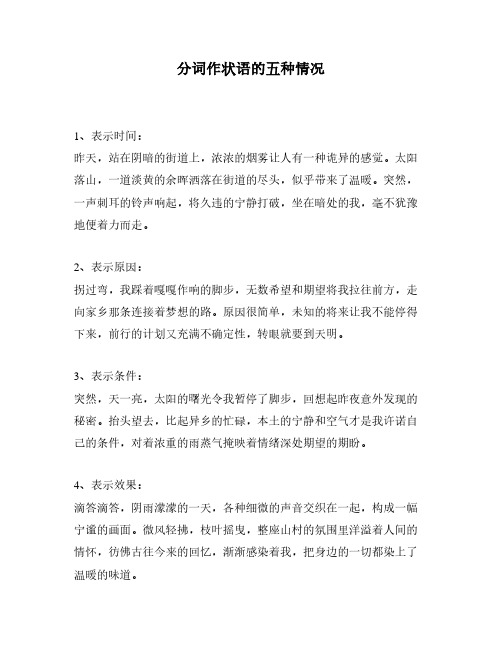
分词作状语的五种情况
1、表示时间:
昨天,站在阴暗的街道上,浓浓的烟雾让人有一种诡异的感觉。
太阳落山,一道淡黄的余晖洒落在街道的尽头,似乎带来了温暖。
突然,一声刺耳的铃声响起,将久违的宁静打破,坐在暗处的我,毫不犹豫地便着力而走。
2、表示原因:
拐过弯,我踩着嘎嘎作响的脚步,无数希望和期望将我拉往前方,走向家乡那条连接着梦想的路。
原因很简单,未知的将来让我不能停得下来,前行的计划又充满不确定性,转眼就要到天明。
3、表示条件:
突然,天一亮,太阳的曙光令我暂停了脚步,回想起昨夜意外发现的秘密。
抬头望去,比起异乡的忙碌,本土的宁静和空气才是我许诺自己的条件,对着浓重的雨蒸气掩映着情绪深处期望的期盼。
4、表示效果:
滴答滴答,阴雨濛濛的一天,各种细微的声音交织在一起,构成一幅宁谧的画面。
微风轻拂,枝叶摇曳,整座山村的氛围里洋溢着人间的情怀,彷佛古往今来的回忆,渐渐感染着我,把身边的一切都染上了温暖的味道。
5、表示方式:
趁着丝丝晨雾未散的时刻,抽出一伙人携手暗中离去,终于享受到了米饭之间的松软,延续着昔日快乐的痕迹。
把一切都收拾妥当,仿佛穿越时空一样,令一个个熟悉的瞬间再次涌现心中,萦绕着幽暗曾经的眼前。
英语分词作状语知识点总结

英语分词作状语知识点总结在学习英语的这条漫漫长路上,分词作状语这个知识点就像一个有点调皮的小精灵,时不时跳出来给咱使点绊子。
但别怕,今儿个咱就把它给拿捏得死死的!先来说说啥是分词作状语。
简单来讲,分词包括现在分词(doing)和过去分词(done),它们跑到句子里作状语,那作用可大了去了。
比如说,“Walking in the park, I saw a beautiful flower” 这里的“walking in the park”就是现在分词作状语,表示“我”在公园里走这个动作和后面“看到花”这个动作是同时发生的。
咱再细瞅瞅现在分词作状语的情况。
它可以表示时间、原因、条件、结果、伴随等等。
就拿时间来说吧,“Hearing the news, she jumped with joy” 听到消息的同时,她高兴得跳了起来,“hearing”就表明了两个动作几乎同时发生。
再比如原因,“Being ill, he didn't go to school” 因为生病,所以他没去上学,“being ill”就解释了为啥他没去学校。
过去分词作状语也有它的门道。
像“Seen from the top of the mountain, the city looks beautiful” 从山顶上看,城市很美。
这里“seen”就表示城市是被看的,有一种被动的意味。
我还记得当初学这个知识点的时候,那叫一个迷糊。
老师在讲台上讲得唾沫横飞,我在下面听得云里雾里。
有一次做作业,碰到一道题:“_____ by the teacher, the boy felt ashamed” 选项有 A Scolded BScolding C To scold D Having scolded 。
我瞅了半天,心里那个纠结啊,感觉每个选项都好像对又好像不对。
最后一咬牙,选了个 B,结果当然是错得一塌糊涂。
老师把我叫到办公室,耐心地给我讲解:“这道题是过去分词作状语,表示被动,被老师批评,所以应该选 A 呀。
分词作状语用法
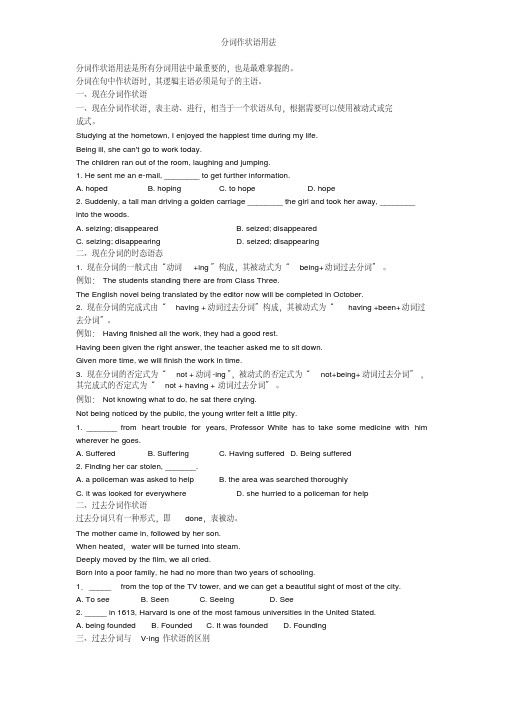
Given more time, we could have done it better.
=If we had been given more time, we could have done it better.
______ time, he ’ ll make a-cfliarsts tennis player.
A. To see
B. Seen
C. Seeing
D. See
2. _____ in 1613, Harvard is one of the most famous universities in the United Stated.
A. being founded B. Founded C. It was founded 三、过去分词与 V-ing 作状语的区别
=As she was very weak, she couldn
’ t move.
(1) _____with so much trouble, we failed to complete the task on time.
A. Faced
B. Face C. Facing
D. To face
(2) ____for the breakdown of the school computer network, Alice was in low spirits.
2. ____ alone in the dark room, the little boy was so frightened as to cry.
A. Leaving
B. Left
C. To be left
D. Having left
3._____ by the beauty of nature, the girl from London decided to spend another two days on the
分词作状语的类型
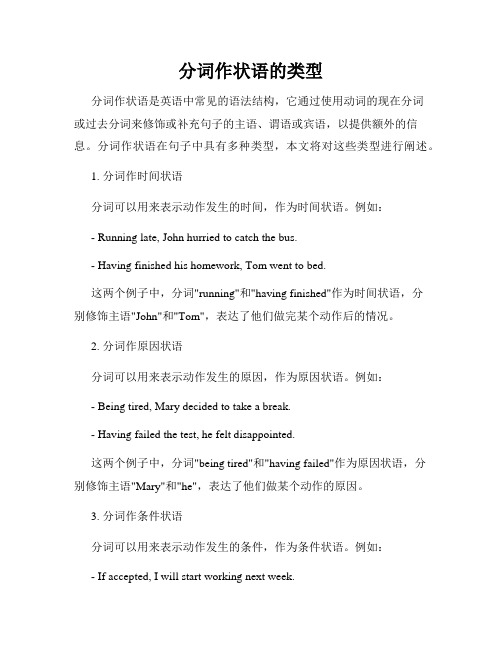
分词作状语的类型分词作状语是英语中常见的语法结构,它通过使用动词的现在分词或过去分词来修饰或补充句子的主语、谓语或宾语,以提供额外的信息。
分词作状语在句子中具有多种类型,本文将对这些类型进行阐述。
1. 分词作时间状语分词可以用来表示动作发生的时间,作为时间状语。
例如:- Running late, John hurried to catch the bus.- Having finished his homework, Tom went to bed.这两个例子中,分词"running"和"having finished"作为时间状语,分别修饰主语"John"和"Tom",表达了他们做完某个动作后的情况。
2. 分词作原因状语分词可以用来表示动作发生的原因,作为原因状语。
例如:- Being tired, Mary decided to take a break.- Having failed the test, he felt disappointed.这两个例子中,分词"being tired"和"having failed"作为原因状语,分别修饰主语"Mary"和"he",表达了他们做某个动作的原因。
3. 分词作条件状语分词可以用来表示动作发生的条件,作为条件状语。
例如:- If accepted, I will start working next week.- Without any money, he couldn't buy the ticket.这两个例子中,分词"accepted"和"without any money"作为条件状语,分别修饰主语"I"和"he",表达了他们做某个动作所需要的条件或限制。
分词作状语的特殊结构
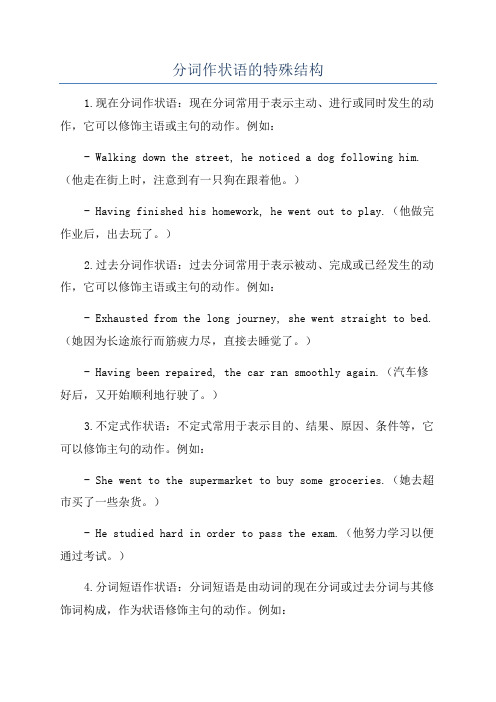
分词作状语的特殊结构1.现在分词作状语:现在分词常用于表示主动、进行或同时发生的动作,它可以修饰主语或主句的动作。
例如:- Walking down the street, he noticed a dog following him.(他走在街上时,注意到有一只狗在跟着他。
)- Having finished his homework, he went out to play.(他做完作业后,出去玩了。
)2.过去分词作状语:过去分词常用于表示被动、完成或已经发生的动作,它可以修饰主语或主句的动作。
例如:- Exhausted from the long journey, she went straight to bed.(她因为长途旅行而筋疲力尽,直接去睡觉了。
)- Having been repaired, the car ran smoothly again.(汽车修好后,又开始顺利地行驶了。
)3.不定式作状语:不定式常用于表示目的、结果、原因、条件等,它可以修饰主句的动作。
例如:- She went to the supermarket to buy some groceries.(她去超市买了一些杂货。
)- He studied hard in order to pass the exam.(他努力学习以便通过考试。
)4.分词短语作状语:分词短语是由动词的现在分词或过去分词与其修饰词构成,作为状语修饰主句的动作。
例如:- The boy ran into the room, crying loudly.(那个男孩跑进房间,大声哭着。
)- The car skidded on the wet road, causing an accident.(汽车在湿滑的路上打滑,导致了一起事故。
)这些特殊结构的分词作状语可以增加句子的信息量,使句子更加丰富和生动。
分词作状语

分词作状语在语法中,状语是一种修饰动词、形容词、副词或全句的词组或从句。
状语可以提供关于时间、地点、方式、原因、条件等方面的信息,以帮助读者更好地理解句子的意思。
在中文中,分词可以作为状语出现,以更准确地表达句子的含义和语气。
分词作时间状语分词作时间状语时,可以表示动作的时间、先后顺序、频率等。
常见的分词作时间状语的结构有“分词+时间状语”。
例句:1.昨天下雨,我带着雨伞走到学校。
2.听着音乐,我写完了这篇文章。
在上述例句中,分词作时间状语“听着音乐”和“带着雨伞”分别表示动作发生的时间和做某事的状态。
分词作地点状语分词作地点状语时,可以表示动作发生的地点或者动作的范围。
常见的分词作地点状语的结构有“分词+地点状语”。
例句:1.在花园里散步的时候,我发现了一只漂亮的蝴蝶。
2.躺在床上看书,我感到异常放松。
在上述例句中,分词作地点状语“在花园里散步的时候”和“躺在床上”分别表示动作发生的地点或者动作的范围。
分词作方式状语分词作方式状语时,可以表示动作的方式、方法等。
常见的分词作方式状语的结构有“分词+方式状语”。
例句:1.他用力地关上了门。
2.小明一边跳舞一边唱歌。
在上述例句中,分词作方式状语“用力地关上了门”和“一边跳舞一边唱歌”分别表示动作的方式。
分词作原因状语分词作原因状语时,可以表示动作的原因或动作发生的原因。
常见的分词作原因状语的结构有“分词+原因状语”。
例句:1.太阳下山了,天黑了。
2.因为下雨,所以他没有去散步。
在上述例句中,分词作原因状语“太阳下山了”和“因为下雨”分别表示动作发生的原因。
分词作条件状语分词作条件状语时,可以表示实现某种结果的条件。
常见的分词作条件状语的结构有“分词+条件状语”。
例句:1.如果你不努力学习,你就无法取得好成绩。
2.要是天气好,我们就去郊游。
在上述例句中,分词作条件状语“如果你不努力学习”和“要是天气好”分别表示实现某种结果的条件。
总结通过以上例句的分析,我们可以看出分词作状语能够丰富句子的表达,使得句子更加准确和生动。
分词作状语

分词作状语现在分词作状语,其实多数情况下是现在分词和它的连带成分一起作状语,即现在分词短语作状语,相当于其相应的状语从句。
多数情况下置于句首,也可置于句末。
例:1.作时间状语Entering the classroom, the students began to read English.一进教室,学生们就开始读英语。
(相当于As soon as/After they entered the classroom)2.作原因状语The girl doesn't feel like eating any food, being ill for a few days.女孩不想吃任何食物,她病了好几天了。
(相当于Because she has been ill for a few days或Because of her being ill for a few days)3.作条件状语Working hard, he will succeed in passing the English examination.努力学习的话,他就可以通过英语考试。
(相当于从句If he works hard)4.作让步状语Being tired after work, he still insists on studying French.下班后很累,他任然坚持学习法语。
(相当于Though he is tired after work或Though tired after work)5.作结果状语People all over the world sing the song, making it popular.全世界的人都唱这首歌,使它流行了起来。
(相当于so that they make it popular)6.作方式状语Travelling by car , we enjoyed many beautifull places.乘车旅行,我们欣赏了很多优美地方。
分词作状语和独立主格结构

分词作状语和独立主格结构现在分词作状语:- Walking home, he saw a dog on the street.(现在分词作时间状语)- With the problem solved, she could relax.(现在分词作原因状语)- Smiling happily, the child thanked her teacher.(现在分词作方式状语)过去分词作状语:- Exhausted from the long journey, they went straight to bed.(过去分词作原因状语)- Surprised by the news, she dropped her phone.(过去分词作结果状语)- Broken down, the car couldn't start.(过去分词作条件状语)- Pleased with the results, she celebrated with her friends.(过去分词作方式状语)独立主格结构是由名词或代词与分词构成的结构,说明一个动作或状态跟随、伴随另一个动作或状态发生。
独立主格结构可以表示时间、原因、条件、方式等。
- His breakfast finished, Jack left the house.(时间独立主格结构)- The rain stopped, the players continued the game.(条件独立主格结构)- The cake eaten, the children happily played in the garden.(原因独立主格结构)- The teacher angry, the students were silent.(方式独立主格结构)需要注意的是,独立主格结构通常放在句子的开头或结尾,用逗号与主句分隔开来。
分词 (现在分词,过去分词)作 状语

可以表示时间,原因,条件,结果,伴随,让步等情况。
举例:1.Seeing from the top of the mountain,he saw a beautiful city.2.Her mother died in 2001,leaving her with her younger brother.3.Having read the letter from her daughter,he sat down with relief.4.Not having received any letter from him, I gave him a call.对比:Not knowing his dress,she went to a policeman for help.5.Seen from the top of the mountain,Chongqing is a beautiful city.6.The child learns fast,well brought up by his parents.7.Being struck by the heavy storm,they felt helpless.8.Having been told many times,he still repeated the same mistake. 总结:分词做状语的表现形式及区别注意点:1. 表示时间关系的分词短语有时候可以由while/when引出。
Eg:When offered help,one often says,“thank you”.Be careful when crossing the street.2.有些分词货不定式短语作状语,其形式不受上下文限制,我们称其为独立成分。
常见的有:Generally/frankly speaking;Judging from/by;Considering/ taking .....into consideration;To tell you the truth;Seeing....考虑到;Supposing....假如,如果;Provided (that)....如果;3.独立主格的问题。
分词作状语(附练习)
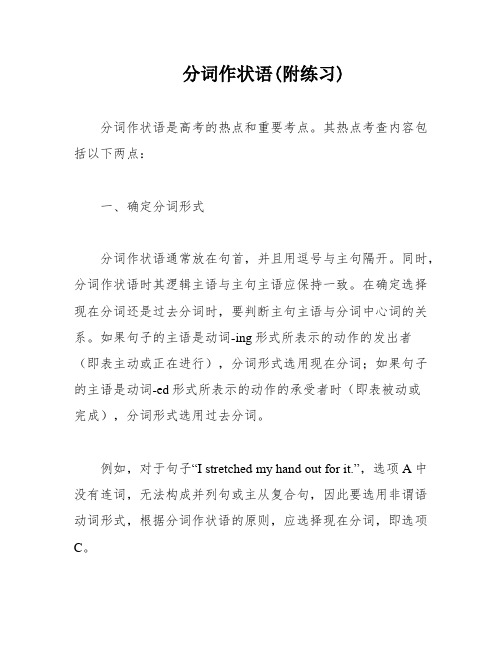
分词作状语(附练习)分词作状语是高考的热点和重要考点。
其热点考查内容包括以下两点:一、确定分词形式分词作状语通常放在句首,并且用逗号与主句隔开。
同时,分词作状语时其逻辑主语与主句主语应保持一致。
在确定选择现在分词还是过去分词时,要判断主句主语与分词中心词的关系。
如果句子的主语是动词-ing形式所表示的动作的发出者(即表主动或正在进行),分词形式选用现在分词;如果句子的主语是动词-ed形式所表示的动作的承受者时(即表被动或完成),分词形式选用过去分词。
例如,对于句子“I stretched my hand out for it.”,选项A中没有连词,无法构成并列句或主从复合句,因此要选用非谓语动词形式,根据分词作状语的原则,应选择现在分词,即选项C。
又如,对于句子“Seen from the hill。
XXX.”,分析可知“Seen from the hill”是过去分词作状语,其逻辑主语应与句子的主语一致,即“the park”。
它们之间表示被动关系,因此分词形式用seen。
二、确立句子主语可能是谁在确立句子主语可能是谁时,仍然遵循分词作状语时其逻辑主语与主句主语应保持一致的原则。
反过来要根据分词形式确定句子主语。
例如,对于句子“XXX。
_________.”,分析可知分词作状语中的主语为“they”,因此选项A中的“doctors”不符合逻辑,应选B中的“XXX”。
独立主格结构是一种常用的非谓语动词结构,它由名词或代词与动词-ing形式或动词-ed形式构成。
在这种结构中,分词的逻辑主语与主句的主语可以一致,也可以不一致。
如果分词的逻辑主语与主句的主语不一致,分词需要有自己独立的逻辑主语。
这种结构相当于一个状语从句,常用于修饰主句的动作或状态。
分词形式的选择取决于名词/代词与v-ing/v-ed形式所表示动作的逻辑关系,如果它们之间表示主动或分词动作正在进行,选择现在分词,如果它们之间表示被动或完成,选择过去分词。
分词作状语的用法
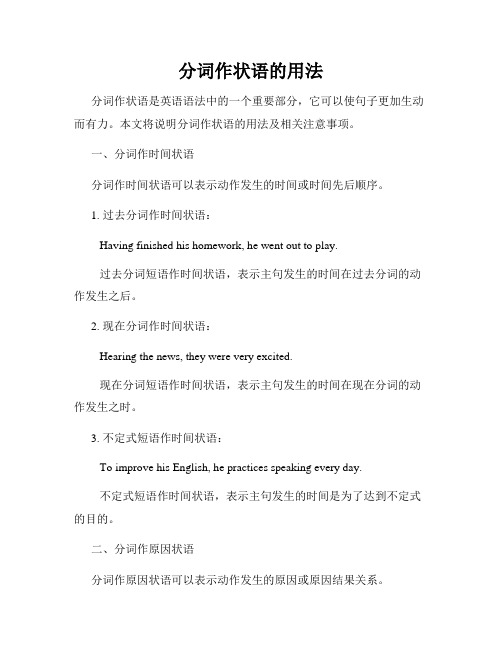
分词作状语的用法分词作状语是英语语法中的一个重要部分,它可以使句子更加生动而有力。
本文将说明分词作状语的用法及相关注意事项。
一、分词作时间状语分词作时间状语可以表示动作发生的时间或时间先后顺序。
1. 过去分词作时间状语:Having finished his homework, he went out to play.过去分词短语作时间状语,表示主句发生的时间在过去分词的动作发生之后。
2. 现在分词作时间状语:Hearing the news, they were very excited.现在分词短语作时间状语,表示主句发生的时间在现在分词的动作发生之时。
3. 不定式短语作时间状语:To improve his English, he practices speaking every day.不定式短语作时间状语,表示主句发生的时间是为了达到不定式的目的。
二、分词作原因状语分词作原因状语可以表示动作发生的原因或原因结果关系。
1. 过去分词作原因状语:Being tired, she decided to go to bed early.过去分词短语作原因状语,表示主句发生的原因是过去分词的动作。
2. 现在分词作原因状语:Seeing the dark clouds, they decided to bring umbrellas.现在分词短语作原因状语,表示主句发生的原因是现在分词的动作。
3. 不定式短语作原因状语:To save money, he stopped eating out.不定式短语作原因状语,表示主句发生的原因是不定式的目的。
三、分词作条件状语分词作条件状语可以表示动作发生的条件或条件结果关系。
1. 过去分词作条件状语:Given the chance, he would travel around the world.过去分词短语作条件状语,表示主句发生的条件是过去分词的动作。
分词作状语

1. The secretary worked late into the night, _____ a long speech for the president.
A. to prepare B. preparing C. prepared D. was preparing 2. ______ a reply, he decided to write again. A.Not receiving B. Receiving not C.Not having received D. Having not received
非 谓 语 动 词
不定式 过去分词 -ing 作状语:可以表示条件、时间、原因、 方式、伴随、结果、让步等,相当于一个 状语从句
二 分词作状语的形式及意义
形式 doing
意义 与句中主语构成逻辑 上的主谓关系,与句 中谓语动词基本上同 时发生, 与句中主语构成逻辑 上的主谓关系,先于 谓语动词发生。 与句中主语构成逻辑 上的动宾关系(即被 动关系)
3. “Can’t you read?” she said angrily, ___ to the notice. A. pointed B. and pointing C. pointing D. to point C
4.__________ the classroom, the students went to the playground to watch the football match. A. To clean B. Having cleaned C. Cleaned D. Cleaning 5. When I got back home I saw a message pinned to the door ________"Sorry to miss you; will call later.“ A. read B. reads C. to read D. reading 4. ___ your homework, you mustn’t listen to music. A. When do C. When doing C B. When to do D. When you
分词作状语例子
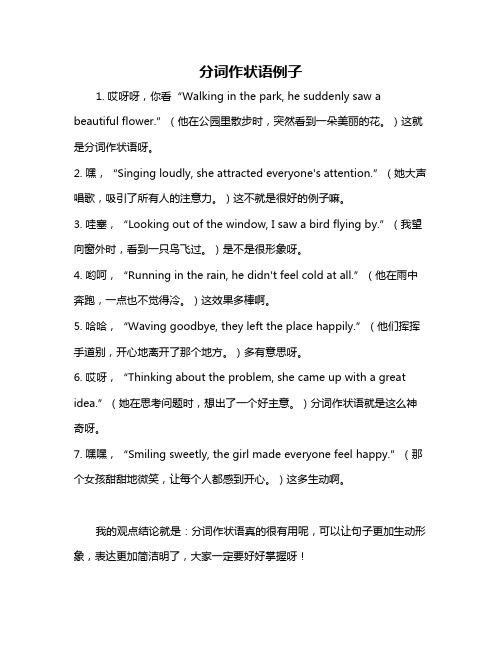
分词作状语例子
1. 哎呀呀,你看“Walking in the park, he suddenly saw a beautiful flower.”(他在公园里散步时,突然看到一朵美丽的花。
)这就是分词作状语呀。
2. 嘿,“Singing loudly, she attracted everyone's attention.”(她大声唱歌,吸引了所有人的注意力。
)这不就是很好的例子嘛。
3. 哇塞,“Looking out of the window, I saw a bird flying by.”(我望向窗外时,看到一只鸟飞过。
)是不是很形象呀。
4. 哟呵,“Running in the rain, he didn't feel cold at all.”(他在雨中奔跑,一点也不觉得冷。
)这效果多棒啊。
5. 哈哈,“Waving goodbye, they left the place happily.”(他们挥挥手道别,开心地离开了那个地方。
)多有意思呀。
6. 哎呀,“Thinking about the problem, she came up with a grea t idea.”(她在思考问题时,想出了一个好主意。
)分词作状语就是这么神奇呀。
7. 嘿嘿,“Smiling sweetly, the girl made everyone feel happy.”(那个女孩甜甜地微笑,让每个人都感到开心。
)这多生动啊。
我的观点结论就是:分词作状语真的很有用呢,可以让句子更加生动形象,表达更加简洁明了,大家一定要好好掌握呀!。
分词作状语
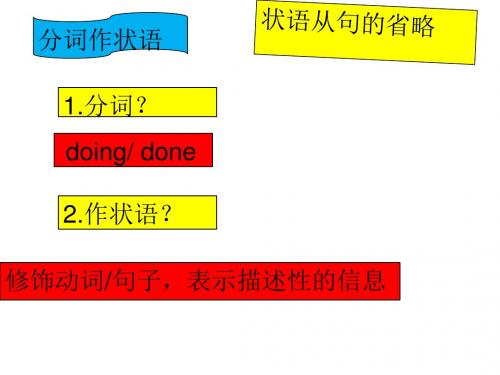
seeing
seen
分词作状语,主语是问题。逗号前后 两动作,共用一主语。主语找出后, 再来判关系。主动-ing,被动用-ed.
分词作状语 1.分词?
doing/ done 2.作状语? 修饰动词/句子,表示描述性的信息
时间状语从句ຫໍສະໝຸດ 主句While he was talking with me, he broke his cup carelessly. While talking with me, he broke his cup carelessly.
Talking with me, he broke his cup carelessly.
doing 分词,作状语(修饰句子,表示主动)
After the man glanced at the bits of wood and metal, the man sadly picked up the mattress. After glancing at the bits of wood and metal, the man sadly picked up the mattress.
总结一下:两件事主语相同:一件事写成 句子;另一件事写成分词作状语.
我走进教室,拿着一个包。
I walked into the classroom, taking a bag.
我走进教室,被5个同学跟着。
I walked into the classroom, followed by five students.
Punished, she burst into tears.
done分词,作状语(修饰句子,表示被动)
分词作状语: doing表示主动 done表示被动
分词作状语
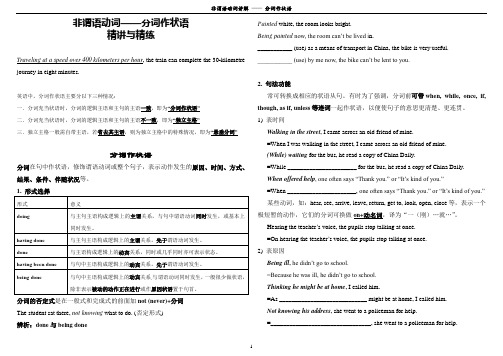
非谓语动词——分词作状语精讲与精练Traveling at a speed over 400 kilometers per hour, the train can complete the 30-kilometre journey in eight minutes.英语中,分词作状语主要分以下三种情况:一.分词充当状语时,分词的逻辑主语和主句的主语一致,即为“分词作状语”二.分词充当状语时,分词的逻辑主语和主句的主语不一致,即为“独立主格”三.独立主格一般需自带主语,若省去其主语,则为独立主格中的特殊情况,即为“悬垂分词”分词作状语分词在句中作状语,修饰谓语动词或整个句子,表示动作发生的原因、时间、方式、结果、条件、伴随状况等。
分词的否定式是在一般式和完成式的前面加not (never)+分词The student sat there, not knowing what to do. (否定形式)辨析:done与being done Painted white, the room looks bright.Being painted now, the room can’t be lived i n.___________ (use) as a means of transport in China, the bike is very useful.___________ (use) by me now, the bike can’t be lent to you.2. 句法功能常可转换成相应的状语从句。
有时为了强调,分词前可带when, while, once, if, though, as if, unless等连词一起作状语,以便使句子的意思更清楚、更连贯。
1) 表时间Walking in the street, I came across an old friend of mine.=When I was walking in the street, I came across an old friend of mine.(While) waiting for the bus, he read a copy of China Daily.=While ______________________ for the bus, he read a copy of China Daily.When offered help, one often says “Thank you.” or “It’s kind of you.”=When ______________________, one often says “Thank you.” or “It’s kind of you.”某些动词,如:hear, see, arrive, leave, return, get to, look, open, close等,表示一个极短暂的动作,它们的分词可换做on+动名词,译为“一(刚)…就…”。
分词作状语的用法
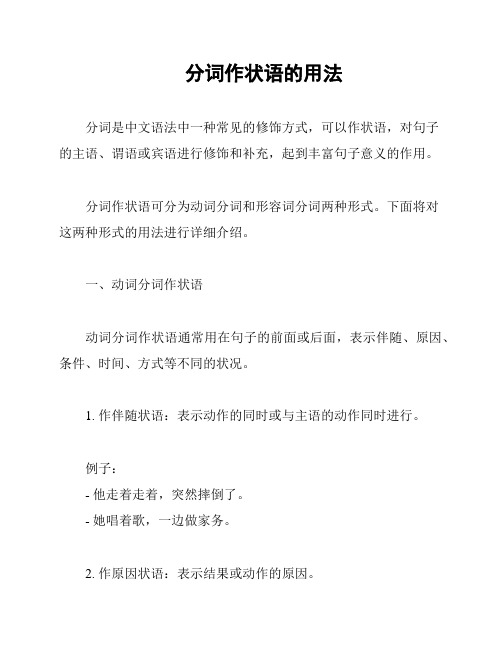
分词作状语的用法分词是中文语法中一种常见的修饰方式,可以作状语,对句子的主语、谓语或宾语进行修饰和补充,起到丰富句子意义的作用。
分词作状语可分为动词分词和形容词分词两种形式。
下面将对这两种形式的用法进行详细介绍。
一、动词分词作状语动词分词作状语通常用在句子的前面或后面,表示伴随、原因、条件、时间、方式等不同的状况。
1. 作伴随状语:表示动作的同时或与主语的动作同时进行。
例子:- 他走着走着,突然摔倒了。
- 她唱着歌,一边做家务。
2. 作原因状语:表示结果或动作的原因。
例子:- 天气太热了,我们休息了一下。
- 时间太晚了,我不敢回家。
3. 作条件状语:表示动作发生的条件。
例子:- 如有需要,我会随时提供帮助。
- 除非你同意,否则我们无法合作。
4. 作时间状语:表示动作发生的时间。
例子:- 老师站在门口,等着学生进来。
- 他一声不响地坐在那里,等待着消息。
5. 作方式状语:表示动作的方式或方式的补充。
例子:- 他冷静地看着对方,不做任何反应。
- 她快速地做完作业后,离开了教室。
二、形容词分词作状语形容词分词作状语通常用在句子的前面或后面,修饰句子的主语或宾语,描述它们的状态或特征。
1. 作状语修饰主语:表示主语的状态或特征。
例子:- 感动的故事,让听众纷纷落泪。
- 失望的结果,让他心情低落。
2. 作状语修饰宾语:表示宾语的状态或特征。
例子:- 他们把老旧的建筑物改造成了现代化的办公楼。
- 她吃惊地看着手中的礼物。
以上是分词作状语的基本用法,希望对你有所帮助。
非谓语动词用法精讲分词作状语的用法和常见形式

非谓语动词用法精讲分词作状语的用法和常见形式非谓语动词用法精讲:分词作状语的用法和常见形式非谓语动词是指不作谓语,不具备时态和人称变化的动词形式,包括不定式、动名词和分词。
其中,分词作为非谓语动词的一种形式,常常被用作状语来修饰句子的主语、宾语或其他成分。
本文将重点讲解分词作为状语的用法和常见形式。
一、分词作状语的用途分词作为状语可以表示时间、原因、条件、结果、方式等不同的语义关系。
根据这些关系,分词可以用作时间状语、原因状语、条件状语、结果状语和方式状语。
1. 分词作时间状语分词作时间状语时,可以表示动作发生的时间、顺序或同时性等。
常见的分词形式包括现在分词和过去分词。
- Walking along the river, I saw a beautiful sunset.- Having finished my homework, I went out to play.- Having been a teacher for many years, he knows how to handle students.2. 分词作原因状语包括现在分词和过去分词。
- Being tired, she decided to take a nap.- Seen from the top of the mountain, the city looked magnificent.- The car crashed into a tree, causing serious injuries.3. 分词作条件状语分词作条件状语时,可以表示动作发生的条件。
常见的分词形式包括现在分词和过去分词。
- Provided with enough resources, they can finish the project on time.- Weather permitting, we will have a picnic in the park.- Given the circumstances, I had no choice but to accept the offer.4. 分词作结果状语分词作结果状语时,可以表示动作的结果或效果。
- 1、下载文档前请自行甄别文档内容的完整性,平台不提供额外的编辑、内容补充、找答案等附加服务。
- 2、"仅部分预览"的文档,不可在线预览部分如存在完整性等问题,可反馈申请退款(可完整预览的文档不适用该条件!)。
- 3、如文档侵犯您的权益,请联系客服反馈,我们会尽快为您处理(人工客服工作时间:9:00-18:30)。
5. 表结果: 表结果时,一般放在句末,否则意义会不 同 比较: Finding he was absent, I went home. (表时间) I went home, finding he was absent. (表结果) It rained for three days, completely ruining our holiday. In recent years, railroads have been combining with each other and merging into supersystems, causing heightened concerns about monop
独立分词结构1. 独立分词结构1. “n. + participle” participle” 作状语:
独立分词结构:逻辑主语不一致,分词 动作的执行者(发出者)与谓语动作的 执行者(发出者)不一致,分词有自己 独立的主语。 (为独立主格结构的一种)
Weather permitting, we’ll be going fishing tomorrow. (if weather permits,...) Nobody having any more to say, the meeting was closed. (since nobody had any more to say,…) The Chinese word for crisis is divided into two characters, one meaning danger and the other meaning opportunity. (改错)The Portuguese give a great deal of credit to one man for having promoted sea travel, that man was Prince Henry the navigator, who lived in the 15th century.
单独的分词(短语)作状语: 注意:选择现在分词还是过去分词,关 键看主句的主语。如分词的动作是主句 的主语发出,分词就选用现在分词,反 之就用过去分词。 e.g.: Used for a long time, the book looks old. 由于用了很长时间,这本书看上去 很旧。 Using the book, I find it useful. 在使用的过程中,我发hones have broken many social taboos, with people answering calls in the middle of a conversation or chatting away on the toilet. With more than 3 million hardcover copies __ (sell) in its first two years of publication, Who Moved My Cheese? Has become an amazing best-seller, __(top) the New York Times, Wall Street Journal, Business Week and USA Today lists.
2. 表时间: Having watered the garden, he began to mow the lawn. = after he had watered the garden, he began to mow the lawn. Reading the letter, she burst out crying. = as she read the letter, she burst out crying. Riding in the street during the rush hours, you must be careful. = when you are riding in the street during the rush hours, you must be careful.
悬垂分词”dangling participle: 逻辑主语不一致,不搭配 =汉语无无主 语句 After jumping out of a boat, . A. the shark bites the man B. the shark bit the man C. the man was bitten by a shark D. the man is bitten by a shark
6. 表方式: She came running hurriedly into her husband’s office one morning. Feeling threatened, companies responded by writing ever-longer warning labels, trying to anticipate every possible accident.
判断下列句子是否正确: Waiting for a bus, a brick fell on my head. Looking out of the window, there are lots of people in the street. When using computer, the password must be remembered. Being a pop fan, Jay Chou is her favorite.
7. 表补充说明或伴随: I was talking on the radio, telling the guys to bring in resources, activating rapid mobilizations from around the city, calling in cops from every precinct (bureau).
(n.+)分词 (n.+)分词 作状语的意义:
1.
表条件: Given more time, I would be able to complete it. = if I were given more time, I would be able to complete it. If seen under a microscope, a fresh snowflake has a delicate six-pointed shape. (‘If’ can be omitted)
2)不及物动词的过去分词表示动作已经 发生, e.g.: gone, fallen, retired, grown-up, escaped, faded, returned等。 e.g.: a well-read person. 一个读过许多书 的人 a much-traveled man 一个去过许多 地方的人 a burnt-out match 烧完了的火
4.表让步: Mocked at by everybody, he had my sympathy. = though he was mocked at by everybody,… Though understanding no Japanese, Charles was able to communicate with them.
Exercises:
When I arrived home, I found the door was locked. Arriving home, I found the door locked.
There was a mutual attraction between my sister and a trainee, who worked at her office. Both of them were very shy and could barely even speak to each other. During an office party, my sister went into the kitchen to get a drink. And the trainee followed her into it. After he opened the freezer, he took out some ice, and place it on the work surface and began smashing it with a tin of coffee. He smiled and explained, “I just want to break the ice between us.” There was a mutual attraction…..a trainee working at her Office. Hover, both being shy, they could…..other. During an office party, my sister went… and the trainee followed. Opening the freezer, he took…..coffee. Smiling, he explained,…
独立分词结构2 独立分词结构2. “ with+ n. + participle” participle” 作状语:
A car roared past, with smoke pouring from the exhaust. 与“n. + 分词”结果的区别: 意义上只表示: 1. 伴随,补充说明,举例 2. 表示原因
The Participle as Adverbial
分词的语态 1)通常,现在分词表示主动,过去分词表示 被动 e.g.: He is the man giving you the money. (= who gave you…)他就是给你钱的那个人。 He is the man stopped by the car. (= who was stopped by…)他就是那个被车拦 住的人。
